How To Become a Fantasy Writer: Worldbuilding - History

History, such a complex and dazzling subject, is part of all of us and of our cultures, be it World, Country or, simply, Individual. Trustworthy or not, it reminds us of who we were so that we can build what we are and will be.
It doesn't have a father or a mother, it wasn't even invented by anyone. History simply exists. It is our ups and downs as finite beings in this infinite Universe.
It is the mirror of our desire to leave our legacy to the generations that come after us.
It is the air that fills our chests when we boast about the deeds of our ancestors.
History is confusing, yes. But it is human and does not let us forget.

History can be looked at and recorded from different perspectives, the most common being Cultural, Economic, Political, War, Commercial, and many others. Whenever you look at a period of it, you should make a passage, taking into account each of these perspectives, individually. Then you can analyze them all together, as Big Events always have several reasons, where different lines cross.
History is often the record of something that never happened, written by someone who was not present. — Johnny De'Carli
In our real world it is a phrase that generates some controversy. In Worldbuilding, that's exactly what we do. We write invented histories, for our invented worlds.
In this post I'll show you how to build a quick chronology, so you can start giving a past life to the place where your characters live.
History
Any History is made of events, more or less important, that deserve, for some reason or another, their recording for posterity. Let's take a world that I invented for this post, and you can see the different phases of construction of the chronology.
If you already have your world, and you've had the opportunity to see my post about Physical Space, then you can start building your own timeline.

Just grab a pen and paper and we can get started.
Key Events
The first step will be to map out the key events that you think have affected your Civilization. As in the next steps, you can create as many as you like. Please note that Events of this size happen relatively rare. If you have a lot, you will have to find the equivalent reasoning, and add smaller events.
Here I created a European-Christian chronology, with the Marriage of Agpo marking an important milestone in the dates of our chronology.
The construction of the city of Coklen led to the beginning of Civilization as we know it and the Fall of the Kampala Empire marks a period of transition to the present day.
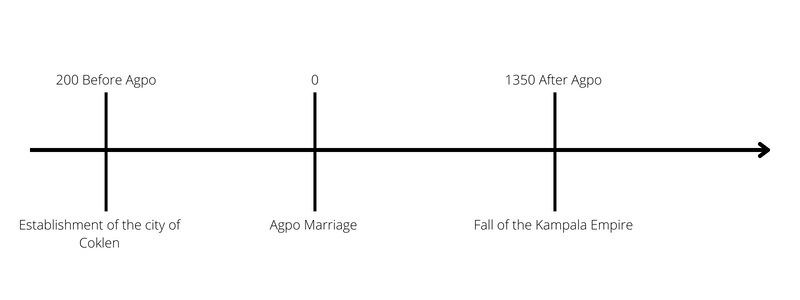
Secondary Events
Once you have your pillars, we can start putting the less important events that affect your world on a medium scale, by themselves, but that could lead to one of the pillars happening.
In 165 BC, 35 years after the founding of the City of Coklen, the Huk Dynasty came into power of the First City, which they would rule until their end, in the year 10 After Agpo, where its last representative would be assassinated.
The Battle of Fune marks the signing of the Treaty of Peace and Commerce, which later evolves into the Marriage of Agpo, uniting several powerful families, for the sake of the prosperity of the Kingdom of Coran.
The Independence of the Kingdom of Fu from the Kampala Empire marks the beginning of the decline of this people, who were once sovereign over all known lands. The scarcity of grain, which came from the fields in the south of Fu, and the example given to the other Realms, ended up creating a slow snowball, which would lead to the Key Event 160 years later.
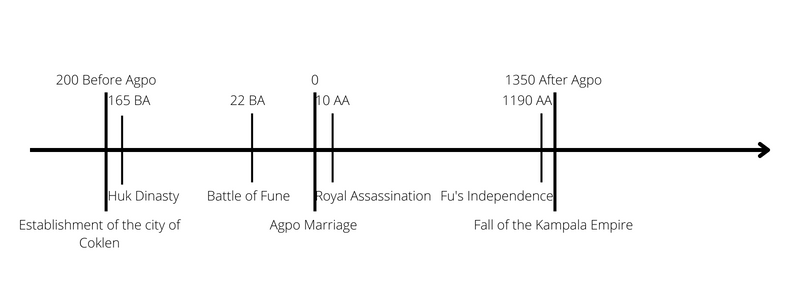
Common Events
These events, although the smallest, are not insignificant at all. In fact, many of them can have a Butterfly Effect, even being the cause of one of the Great Pillars of History.
In 202 AA, the Aren Migration led the first humans to settle in the area of Coran, where the city of Coklen would later be built.
Between 151 and 144 AA, 7 descendants of the Family of Huk fought, for 7 years, for the sovereignty of the city. Later, these families would be the main beneficiaries of the Treaty of Peace and Commerce.
It would also be this Treaty that would lead to a year of extreme poverty and food shortages, which the locals call "The Famine".
The economic crisis, which took place between the years 1076 - 1107 AD, brought with it the first signs that the Kampala Empire was not Almighty after all.
In 1437 AD, a dictatorship was installed in Fu, taking advantage of the Post-Fall to turn its inhabitants against the populations that migrated to its territory.
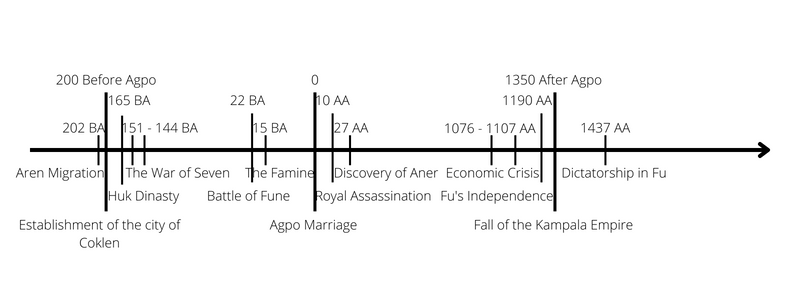
Some periods can be defined as Golden Ages or Ages of Terror.
In 27 AD, the island of Aner was discovered, from where a new ore, more resistant than iron, began to be brought to the mainland. This small event ushered in a Golden Age for the Kampa Kingdom.
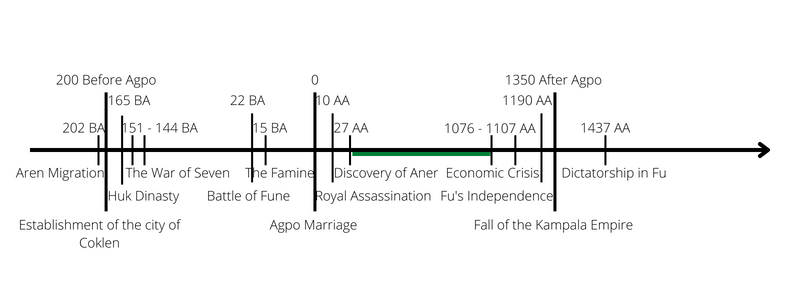
Ages of the World
Large chunks of History, regardless of the Civilization that reports them, end up being aggregated under a broader name.
The Old Days encompasses the time when the different kingdoms were being born and growing.
The Misery Years were the years when there was a lot of war, famine, political games and a lot of poverty.
The Age of Revolt, although marked by a great period, turns out to be a period of institutional and moral revolution.
The Present marks the period in which our narrative will take place.
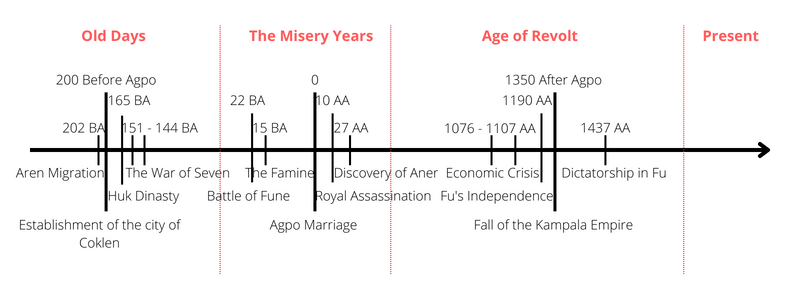
I decided to explain each event in my chronology, because I think it's important that you realize that after you have the name and year of that event, you can create a small narrative for that event, in order to intertwine with the rest.
When making your timeline, don't worry about how much space a line takes up. When I started mine, for my book, I occupied two A4 sheets laid out with three lines.
Just don't forget, the longer the story, the more events you'll have to create to ground the Pillars of History.

Narrative
When writing your narrative, especially in Epic Fantasy, it is highly advisable that you spread elements of this chronology across the various exposition moments. A lived world is a more credible world.





